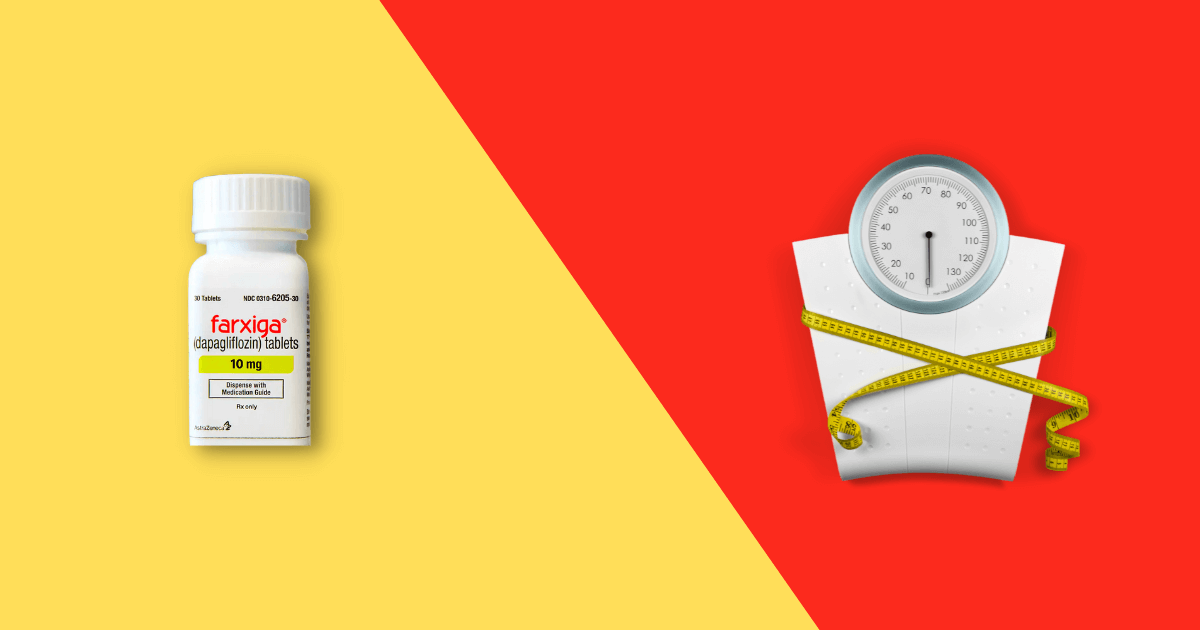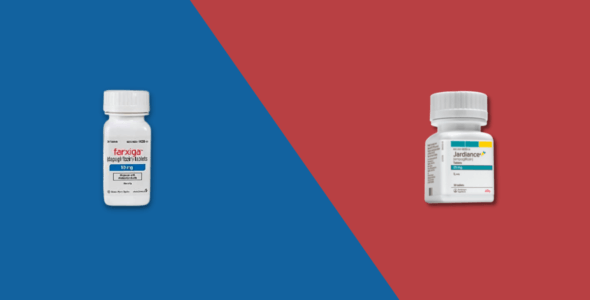Does Farxiga cause weight loss?
Table of contents
Obesity and being overweight affect around 70% of adults in the U.S. and are closely linked to risk factors for diabetes. Losing 5% to 10% of body weight is seen to greatly reduce the risk of cardiovascular disease in adults. Here, we will take a look at Farxiga, how it helps with weight loss, and how some of the alternative treatments for diabetes compared with it.
What is Farxiga?
Farxiga is the brand name for an FDA-approved medication manufactured by AstraZeneca. It is classed as a sodium-glucose cotransporter 2 (SGLT 2 inhibitor) inhibitor and is used to reduce high blood sugar levels in people who have type 2 diabetes. It is also used in certain people to lower the risk of hospitalization for heart failure. Farxiga is approved to be used by people with type 2 diabetes for:
- Improving blood sugar levels when used in combination with changes to diet and exercise
- Reducing the risk of hospitalization for heart failure in people with heart disease or risk factors for heart disease
In individuals with heart failure with or without type 2 diabetes, Farxiga is approved for reducing the risk of hospitalization for heart failure or cardiovascular death in people with reduced ejection fraction. For those with chronic kidney disease that may worsen, Farxiga is approved for reduing the risk of:
- Lowered glomerular filtration rate (GFR)
- Cardiovascular death
- Hospitalization for heart failure
- End-stage kidney disease
The active ingredient in Farxiga is called dapagliflozin. When absorbed into your bloodstream, dapagliflozin slows down the rate at which your kidneys absorb glucose from your blood. This causes your kidneys to release sugar into your urine. Your blood glucose levels then fall as you urinate. Farxiga can be used in combination with other medications for diabetes, including insulin, metformin, or sulfonylureas to lower blood sugar or hemoglobin A1c (HbA1c) levels. Farxiga is not approved for the treatment of type 1 diabetes and should not be used to treat diabetic ketoacidosis (DKA).
What are the common side effects of Farxiga?
The most common possible side effects of Farxiga in clinical trials include:
- Dehydration, changes in urination, dizziness, back pain
- Constipation
- Weight loss
Farxiga can cause more serious side effects, including:
- Low blood sugar (hypoglycemia)
- More serious urinary tract infections (UTI)
- Inflammation of the pancreas (pancreatitis)
- Diabetic ketoacidosis
- A rare bacterial infection that damages the tissue under the skin in the area between the anus and genitals (necrotizing fasciitis)
- Unusual tiredness, nausea, vomiting, abdominal pain, trouble breathing
- Ketoacidosis (increased ketones in your blood or urine)
- Increase in your cholesterol levels
If you experience any of these serious side effects, you should stop taking Farxiga and seek medical attention immediately. You are encouraged to report the negative side effects of prescription drugs to the FDA (Food and Drug Administration). Visit www.fda.gov/medwatch, or call 1-800-FDA-1088.
Does Farxiga cause weight loss?
Farxiga helps you to remove sugar from your body through your urine, preventing your body from absorbing it. This may lead to weight loss.
How rapid is weight loss with Farxiga?
Individuals taking Farxiga, 5 mg or 10 mg each day have been shown to lose around 6 pounds of body weight over 6 months. This was similar to those taking Farxiga in combination with metformin.
Farxiga vs Jardiance for weight loss
Jardiance belongs to the same class of drugs as Farxiga and has similar side effects to Farxiga such as urinary tract infections and genital yeast infections. Jardiance also has a diuretic effect, similar to Farxiga. Jardiance and Farxiga both help to get rid of fluid from the body at the same time as reducing blood sugar levels.
Both drugs are effective for the treatment of heart failure with reduced ejection fraction (the blood pumped out of your heart with each heartbeat) and high blood pressure. Jardiance reduces the risk of death in patients with high cardiovascular risk and Type 2 diabetes (as does Farxiga). Farxiga is also recommended for the reduction of the risk of kidney problems and the progress of kidney disease in patients with chronic renal disease (Jardiance is not).
Jardiance causes a similar level of weight loss in individuals as does Farxiga. Neither medication is however recommended for weight loss. Speak to your doctor for medical advice about weight loss when taking either Farxiga or Jardiance.
Which is better Invokana or Farxiga?
Farxiga and Invokana (canagliflozin) are diabetes drugs with many similar side effects. However, Farxiga has been reported to increase levels of LDL cholesterol, and to increase the risk of bladder cancer which Invokana does not. Farxiga may also cause further damage to kidneys in patients already suffering from moderate to severe kidney damage.
Farxiga and metformin weight loss
Metformin causes a relatively small amount of weight loss, due to its side effects, such as decreased appetite and diarrhea. Metformin is not approved for weight loss.
Farxiga for weight loss in non-diabetics
Farxiga is not FDA-approved as a weight-loss med, but weight loss can be a side effect of the drug. You are advised to speak to your doctor before taking Farxiga for weight loss.
Why take Farxiga in the morning?
Farxiga is available as 5 mg and 10 mg tablets. For Type 2 diabetes mellitus the recommended starting dose is 5 mg once daily, taken in the morning. The dose may be increased to 10 mg once daily if 5 mg is tolerated but require additional glycemic control.
For reducing the risk of hospitalization for heart failure in adults with type 2 diabetes mellitus and cardiovascular disease or multiple cardiovascular risk factors, the recommended dose is 10 mg once daily. For heart failure, the recommended dose is 10 mg once daily.
Before taking Farxiga, tell a healthcare professional about any other medical conditions you may have, all prescription drugs, over-the-counter, and other medications you take. Also tell them about any vitamins, herbs, and supplements you use.
Does Farxiga affect appetite?
Farxiga can cause low blood glucose levels in people with diabetes, especially if they are using it in combination with other medications such as insulin or sulfonylureas. Symptoms can include increased hunger, dizziness, confusion, and sweating. Increased hunger may cause an increase in weight due to an increase in the consumption of food.
Does Farxiga cause erectile dysfunction?
No, Farxiga does not cause erectile dysfunction.
Does Farxiga cause hair loss?
Hair loss is not a side effect of Farxiga, but hair loss and hair thinning may be caused by diabetes due to high blood sugar levels.
Does dapagliflozin cause heart failure?
No, dapagliflozin reduces the risk of heart failure or cardiovascular death in patients with heart failure and reduced ejection fraction and is used to treat type 2 diabetes, heart failure and chronic kidney disease.
Does Farxiga cause cancer?
No, patients using Farxiga are more likely to develop bladder cancer than those using an alternative drug for diabetes.
Farxiga warnings & precautions
Farxiga carries a list of warnings and precautions advising when you shouldn’t use it. Don’t take Farxiga if:
- Are allergic to the active ingredient dapagliflozin
- Are allergic to any of the other ingredients found in Farxiga (listed in the leaflet which comes with the medication)
- Have diabetic ketoacidosis or a history of diabetic ketoacidosis
- Have severe kidney issues or are on dialysis
- Are pregnant or breastfeeding – It is unknown if this drug passes into breast milk
- Are under 18 years of age
Talk to your doctor before taking Farxiga if you:
- Have Type 1 diabetes
- Have liver or kidney problems
- Have heart disease
- Are over 65 years of age
- Are taking medication to lower your blood pressure or have a history of low blood pressure
- Often get urinary tract infections
You should always check with your doctor or pharmacist before taking any medication, including Farxiga, to make sure it is safe for you.
Medically reviewed
A medical professional has reviewed this article.


Jamie Winn, PharmD
Jamie Winn, PharmD
Dr. Jamie Winn received his Doctor of Pharmacy in 2002 from the University of South Carolina College of Pharmacy, Columbia, SC. Jamie is a medical reviewer for NiceRx.





